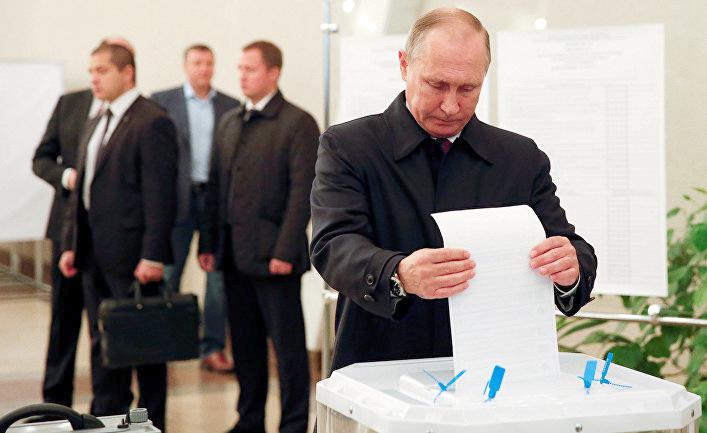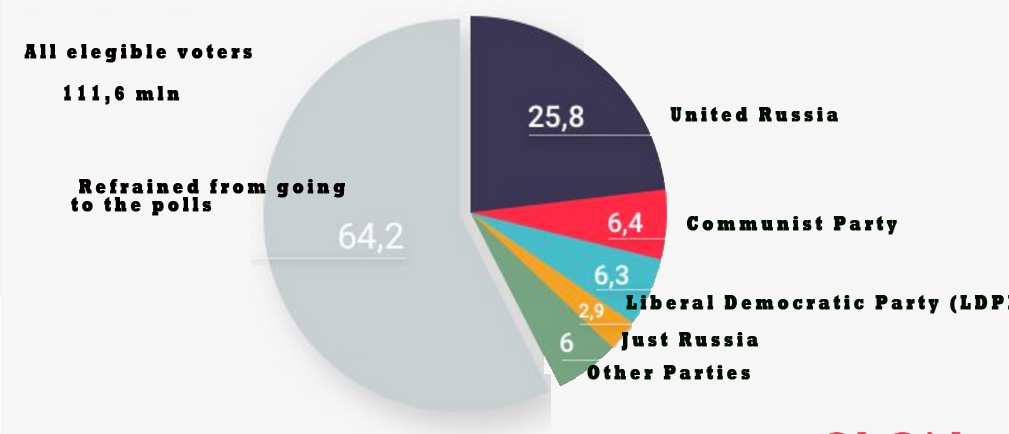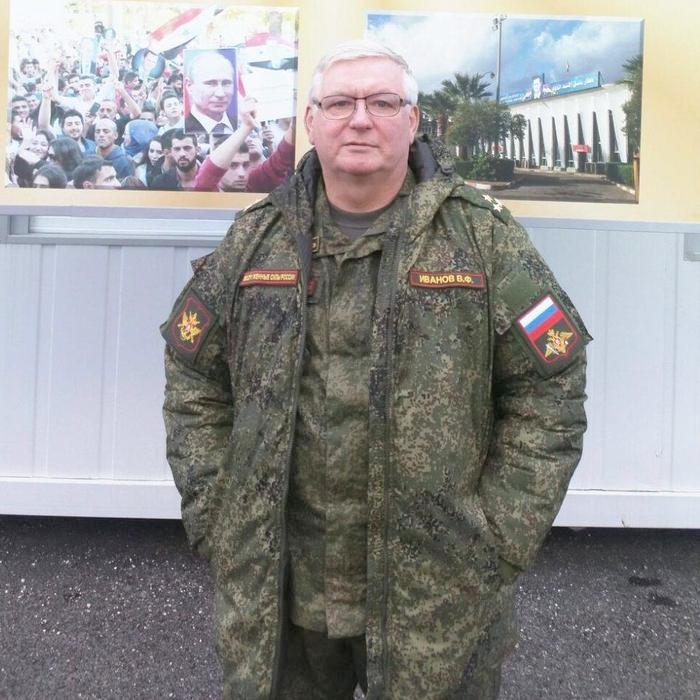The results of the Russia’s 2016 Parliamentary elections were published last week. These results shocked some people: in spite of the fact that this year there was more oversight of the electoral integrity than it was in previous years and in spite of the fact that some liberal opposition parties participated in the election, the new State Duma appears to be the most pro-government in the modern Russian history.
Contrary to expectations, none of the members of the liberal West-oriented opposition was elected into the Duma. Putin’s party of power United Russia now is represented by 343 out of 450 members of Duma, which gives the party the power to determine decisions of the parliament even without voting.
Of course there were places and territories where concentration of supporters of opposition was high. For example in the polling place in the main building of the Moscow University almost 50% of the voters voted for opposition members and only 15.7% for United Russia.
But impact of voting in such places was miniscule. We’ll try to see why
The New York Times stressed the main feature of this election: “The 47.8 percent turnout was a record low for post-Soviet Russia, far below the 60 percent in 2011, and it was especially low in major urban areas. In Moscow, less than 30 percent of eligible voters cast ballots, compared with more than 50 percent in 2011.”
The diagram clearly shows that the new absolute majority of United Russia in Duma was determined not by majority of Russians who voted for this party but by the majority of Russians who refrained from participation in elections. Official propagandists on Russian TV tried to convince audience that those who didn’t vote did so because of their loyalty to United Russia and certainty that the party will win anyway, because all the Russians are loyal to it.
Here is the explanation of the situation given by the popular Russian journalist Vladislav Inozemtsev in the site Snob.ru:
“The majority of the voters have correctly understood that the government is not going to allow the changes, and simply refrained from going to the polls, because the degree of pressure and the inequality of forces have not permitted to expect otherwise.”
Another prominent Russian journalist Dmitry Oreshkin published on radio Echo of Moscow his estimation of the elections’ outcome even before the elections. He showed that in case of the turnout lower then 50% (which was predicted by the polls) on one hand, and the existence of many regions, where majority of population always vote for United Russia by the authorities’ orders and threats to lose their jobs on the other hand, the chances of opposition to get to Duma were zero.
Oreshkin wrote:
“There are about 0.7 million voters In Chechnya. In the presidential election of 2012 official turnout over there was 99.8%… There is no need to explain this figure to the people who’ve had the experience of life in the Soviet Union. There are 3.8 million voters in St. Petersburg. Five times more. But if turnout in St. Petersburg will be, say, 40% (about 1.5 million voters) the difference is reduced already to twice… As a result, the total contribution to the share of the party of power on the part of the mega-city St. Petersburg, the second capital of Russia, is comparable to the contribution of the ‘small, but proud’ mountain Republic. That is despite of the five-fold difference in their weight categories.”
There are plenty of evidence that those Russians, convinced that the government on any account would cause United Russia to win and who therefore who decided not to vote, turned out to be right. For example, majority of people of Muslim Republic of Dagestan voted against United Russia. After the results became known a bunch of“unknown thugs” appeared from nowhere and demolished the election precinct together with all its records. The election was repeated. This time United Russia won.
Vladimir Ryzhkov is one of the best known and brightest representatives of the Russian liberal opposition. He is a professor of history and politician, a co-chair of political party RPR-PARNAS (since 2006) and former Russian State Duma member (1993–2007). In 1997, he was elected Deputy President of the State Duma, becoming the youngest Speaker in its history.
Ryzhkov was a Deputy Head of Administration of Altai Krai (a region of Siberia) in 1991-1993 and represented the capital of the area, the city of Barnaul in the State Duma in 1993-2007. He was born and grown up in that area. He is very popular over there. He keeps actively helping people of Altai Krai.
This time Ryzhkov was again the candidate to represent his native area in Duma.
Many thought that he couldn’t lose.
Prior to elections Ryzhkov told the radio Echo of Moscow how difficult was his electoral campaign. Hundreds of banners of United Russia were placed all over Barnaul, and Ryzhkov couldn’t place even one banner. Advertising companies, frightened by the local government, would not work for him. At nights streets of the city were covered with newspapers describing Ryzhkov as a traitor of his Motherland, foreign agent and thief, who had stolen all the money of Altai Krai. Ryzhkov sued the paper and won. Then dozens of new fake accounts were created in FaceBook, to publish negative information about Ryzhkov. Still Ryzhkov hoped to win.
The election campaign of 2016 in Barnaul was described by some Russian sources as the most crooked in the country. Buses with people voting for several times arrived at polling places, fake ballots were added by the local administration. Ryzhkov lost to the representative of United Russia.
The experience of the liberal opposition was shared by all the competitors of United Russia.
The prominent member of the opposition Alexei Navalny gives an interesting example in his blog:
Colonel Valery Ivanov, who lives in the industrial Sverdlovsk region, liked Putin. Ivanov was a member of the nationalistic–patriotic organization Patriot. He hated the liberal “fifth column”, considering them the Western agents and the traitors of Russia. He went to the election to support Putin as a candidate, representing the nationalistic party Rodina (Motherland), members of which call themselves “The Special President’s Forces.”
Ivanov was popular in his area, but the manipulations of United Russia made it absolutely impossible for a candidate of another party to be elected.
Ivanov wrote on his FaceBook page:
“We trusted the President of Russian Federation Vladimir Putin, who promised us the fair elections… We trusted that we, combat oficers, defenders and patriots of Russia, will get possibility for fair fight with corruptioners, bureaucrats, liberal trators and оther scam. We trusted that there was a reason to spend energy, time and money to win ‘the fair elections of 2016’.
“Yesterday we learned how big was our mistake. Desire of the party of power to win by any means possible turned out to be stronger then fear of President, then Russian laws, then elementary fairness, then anything. This is a slap in the face to all the decent Russians who trusted the possibility of fair elections. This is undermining of the foundations of our statehood, of our constitution, of our stability. It is a crime for which our motherland will pay a terrible price one day.
“You wanted power? You’ve got it. But don’t think we will forget how you’ve got it. And don’t think that we will forgive you.”
Surprises of this election were not limited to those who lost it. There were also some surprising winnings.
By law the candidates must show in their ballots information of their criminal records. And they did. Nevertheless several criminals were elected into the new Duma. Anton Sekirzhitsky, who was previously convicted for rape, was elected in the Tver region.
One of the most sarcastic Russian journalists Andrey Nevzorov gave his explanation of the event in his interview to the radio Echo of Moscow:
“Of course we, people corrupted by civilization and science, find only negative sense in the rape. But do not forget that there is quite a lively sections of society who believe that rape is a sign of masculinity, and even a deеd to be proud of.”




